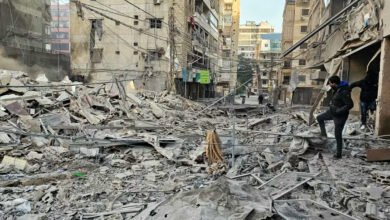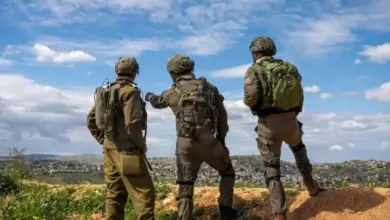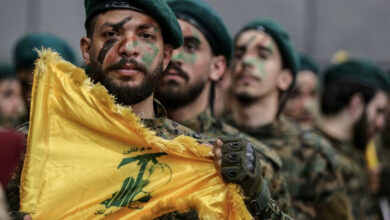LEIDSCHENDAM, Netherlands – Prosecutors analyzed a vast network of telephone records to link four Hizbullah members to the assassination of former Lebanese Prime Minister Rafik Hariri, but there is no clear smoking gun in the case, according to an indictment unsealed Wednesday.
The special court investigating Hariri's murder unsealed the 47-page indictment against four members of the Iranian-backed Shia militia Hizbullah for alleged involvement in the deadly truck bombing that killed Hariri in 2005.
The publication comes after the Special Tribunal for Lebanon said last week that Lebanese authorities had been unable to arrest the four suspects or serve them with their indictments. Hizbullah has denied involvement and said it will never turn over the suspects, but they could be tried in absentia.
They are accused of involvement in the 14 February, 2005, bombing that killed Hariri and 22 others – a number that includes a suicide bomber.
The indictment reveals details of the investigation into a case that has consumed Lebanon for six years.
It says the assassins tracked Hariri's movements over several weeks to establish the routes and movements of his convoy and the location of his vehicle in it. On the day of the murder, they detonated some 2500 kilograms (5510 pounds) of explosives packed into a Mitsubishi van parked near a hotel on a coastal road.
The blast killed Hariri, eight members of his convoy and 13 passers-by along with the suicide bomber, a man whose identity has not been established. It wounded a 231 people.
Prosecutors acknowledge in the indictment's preamble that they have no direct evidence linking the suspects to the attack, despite years of painstaking investigations. The file relies to a large extent on circumstantial evidence "which works logically by inference and deduction," the indictment said.
Tribunal prosecutor Daniel Bellemare welcomed the unsealing of the indictment, saying it "answers many questions" about the attack.
"The full story will, however, only unfold in the courtroom, where an open, public, fair and transparent trial will render a final verdict," he added.
Saad Hariri's allies in government lauded the indictment's release.
"We think that it will reach the facts and it will also reach justice," said legislator Mohammad Kabbani.
The indictment that was released, which has many words and numbers blotted out in black ink, relies substantially on telephone records linking the suspects to the crime. It alleges that a "red network" of cell phones was used by members of the assassination team.
The phone records showed a flurry of calls shortly before Hariri's assassination, then they stopped being used two minutes before the explosion and were never used again. The indictment said the records showed "a coordinated use of these phones to carry out the assassination."
Hizbullah leader Sheik Hassan Nasrallah has long sought to cast doubt on the security of the Lebanon's telephone network, however, and he will likely use the tribunal's evidence to further cast doubt on the court's claims. Nasrallah has called the tribunal an Israeli plot against Lebanon.
Lebanese officials have confirmed that Israel has penetrated and has great control over Lebanon's telecommunications networks. In 2010, authorities detained two senior employees of one of the country's two cellular telecommunication companies on suspicion that they were spying for Israel. They remain in detention several months after their arrest.
Then telecommunications minister Charbel Nahhas confirmed at a news conference held with experts in the field in November that Israel was able to infiltrate Lebanon's mobile telecommunications network and could manipulate phone calls and short messages.
Nasrallah has repeated those claims and said Israel bugged the mobile phones of Hizbullah members, allowing it to make false phone calls and send false text messages and track the users' movements.
Hizbullah's al-Manar television continued with regular programming for nearly two hours before reporting on the indictment being unsealed; other Lebanese media broke in immediately to report on a case.
The indictment accuses Mustafa Badreddine, a Hizbullah commander and the suspected bomb maker who blew up the US Marine barracks in Beirut in 1983, killing 241 Americans, of being the plot's mastermind.
The other suspects are Salim Ayyash, also known as Abu Salim; Assad Sabra; and Hassan Oneissi, who changed his name to Hassan Issa.
Prosecutors alleged Ayyash led the assassination team and the two other suspects were responsible for a false claim of responsibility intended to throw investigators off track.
With Lebanon apparently unable to arrest the suspects, the court – unusually for an international tribunal – could try the suspects in their absence.




